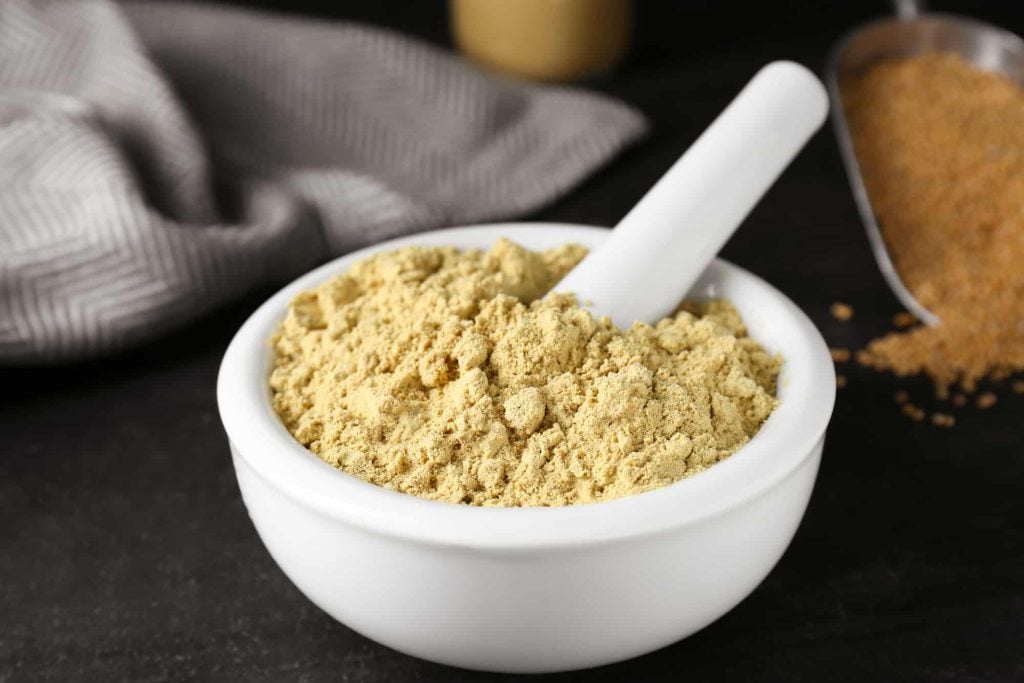If you want to add tanginess and an extra kick to your salad dressing, sauce, or dips, mustard flour or mustard powder is the way to go! But what about its gluten status?
Mustard powder is typically free from gluten. It is also usually sold as a single-ingredient spice. However, it can be exposed to gluten through cross-contamination. If you are unsure about the mustard powder you have, contact the manufacturer.
Are there gluten-free mustard brands that are free from gluten? Find out the answer below!
Is Mustard Powder or Flour Gluten Free?
According to The University of Chicago Celiac Disease Center, natural mustard flour, also called mustard powder or dry mustard flour, is generally free from gluten.
However, if you are in doubt that it has been exposed to gluten, contact the manufacturer if it has been processed using equipment that also processes wheat (source: The University of Chicago Celiac Disease Center).
Apart from wheat, gluten is present in malt, and cross-breed of these grains such as Khorasan, emmer, and spelt (source: Gluten Associated Medical Problems). Other sources are barley, oats (due to being highly likely to be processed in a facility that also processes wheat), and brewer’s yeast.
Mustard powder comes from ground mustard seeds of which the seed coat has been sifted out to produce a fine powder (source: The Kitchn). Most types of it you see on the market are single-ingredient.
If the packaging says “wheat free”, this doesn’t mean that it is gluten-free (source: Celiac Disease Foundation). Always check the packaging or contact the manufacturer of mustard if necessary.
Brand Guide to GF Mustard Powders:
The packaging of the mustard powder will or will not state the gluten status of that particular brand. If the packaging has the “gluten-free” label, it is highly likely to be gluten-free.
The FDA mandates that a food product can bear the label “gluten-free” if its gluten content is less than 20 parts per million (PPM) (source: Celiac Disease Foundation).
In Europe, the regulations on gluten-free labeling are different. There are two kinds of gluten-free labeling: “very low gluten” and “gluten-free”.
Very low gluten covers foods with less than 100 mg/kg of gluten. On the other hand, gluten-free covers those that have less than 20 mg/kg of gluten (source: EUR-Lex).
The EU mandates that all food items containing gluten with scientific proof of an intolerance or allergenic reaction, indicate list of ingredients that contain gluten (source: European Commission).
The “gluten-free” label can cover special-processed food items that don’t have gluten like flour, bread, soups, and ready-to-eat food products as long as they have less than 20 ppm of gluten. This number has been considered to have no effect on people with celiac disease.
The “very low gluten” label, on the other hand, can be found in some European countries, but not much in the UK (source: Coeliac UK).
Let’s take a look at some mustard powder brands and types and see their gluten status.
Colman’s
Colman’s mustard powder doesn’t have a gluten-free label, nor does their website indicate that it is (source: Colmans USA).
Badia
Badia mustard powder also doesn’t have the “gluten-free” label but their website states that it is (source: Badia Spices).
Yellow mustard powder (generic)
Yellow mustard powder comes from yellow mustard seed types which are generally gluten-free based on the definition above.
Most mustard powders available don’t indicate what color seeds the powder is made with. But if you think that a particular brand is and want to confirm it, contact the manufacturer for more information.
Organic Mustard Powder (is this different to standard, from a GF point of view?)
Organic mustard powder is also generally gluten-free if not added with gluten-containing ingredients or exposed to it during production.
We hope you found this article helpful!
If you’re into gluten-free cooking, you might be curious about other essential seasonings. Wondering about garlic powder? Explore our guide on garlic powder and its gluten-free status to learn about its flavor and suitability for your gluten-free lifestyle.


![Is Mustard Flour or Powder Gluten Free? [Brand Info] A white mortar and pestle filled with light brown ginger powder is placed on a dark surface. A striped cloth is folded in the background, and a metal scoop with more mustard powder is partially visible on the right, ensuring this gluten-free ingredient is ready for use.](https://cuisineseeker.com/wp-content/uploads/2023/02/mustard_powder_-768x512.jpg)




Comments are closed.